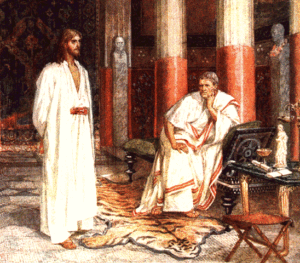If you were to pose the question to most professing Christians, ‘do you believe Jesus was raised from the dead?‘ You would likely get an unhesitant ‘yes.’ Conversely, if you believe so strongly in the miracle of the Resurrection, why are you far less confident about your belief in the other miracles described in the Bible?
As Christians, certitude in the Resurrection goes far beyond mere belief; it is the cornerstone of our hope. Our faith rests on the sureness that Jesus Christ is the Son of God, who came in the flesh, was crucified for our sake, and is the firstborn from the dead. “and if Christ has not been raised, your faith is worthless; you are still in your sins.” (I Corinthians 15:17).
To have complete confidence in the miracle of the Resurrection yet have little in the remaining biblical miracles is a paradox of faith, or a lack thereof. And we must address this paradox of faith. In this article, I will dispense with the prima facie existence of contradictions in the Bible trotted out by unbelievers and focus on the beliefs of professing Christians. I will also ignore the agnostic argument that the Bible is mainly allegorical. My reason for this is presented later in this article.
If we were to measure the strength of our faith, based upon our belief in the miracles recorded in God’s word, excluding the Resurrection, how strong would our faith be? Perhaps the answer to this question would be embarrassing to admit to, thereby exposing the weakness of our faith. If we are wise, we will use this comparison to show us where we are weak and need to strengthen our faith and take steps to do so.
Perhaps we find it easy to believe in the Resurrection because it cannot be dis-proven. It cannot be seen, touched, or verified by video evidence. And oddly enough, the only witnesses to the actual event when it took place were non-believers. Agnostics rarely challenge the Resurrection; even the entire earthly ministry of our Lord is unchallenged since they can offer no proof to the contrary. So its defense is easy because the evidence of the scriptures is every bit as valid as their denial. But easy represents no great victory of faith; it’s simply an impasse.
When it comes to the other miracles described in scripture, we cringe from their defense. Intellectuals challenge us on the validity of Biblical miracles and usually defeat young-in-the-faith Christians in debate. Why? Not because they are correct, but their challenge is based on science while defending our faith. To the world, science represents fact, while faith represents a mere belief.
Are we to waiver in our faith in the Biblical miracles because we cannot prove them scientifically in a vain effort to convince the intellectuals? Certainly not. Even if scientific explanation eludes us, we must accept the biblical miracles at face value. Just because I cannot explain the how of the miracle doesn’t require me to disbelieve the miracle itself.
The ‘world’ (and I mean by the world both learned and unlearned) attacks our faith by belittling our belief in biblical miracles in two ways. They refute the Bible’s events because they are considered scientifically impossible to their logic. Or, they attempt to explain them away, labeling them as acts of nature. But, in reality, doesn’t that prove it’s a miracle.
As Christians, we often face being labeled ‘science deniers’ if we won’t surrender to the mastery of science over faith. I don’t deny science. In fact, I’m very appreciative of the discoveries and accomplishments of the researchers in the various disciplines of science. Science has brought about many improvements to humanity. Conversely, some of their scientific achievements, aka weapons of war, have been used to destroy our fellow man. When science takes the attitude of our-way-or-the-highway towards the people of faith, I recall an appropriate response to that charge so nicely put by G. H. Pember in his book Earth’s Earliest Ages (1876), “So in our days the leaders of science are too often the leaders of infidelity, the despisers of God and of prayer.”
My friends, science has changed its decisiveness on many topics throughout history. But God never changes. They never refer to those positions as beliefs; no, indeed, they carefully refer to previously held positions as theory. So it’s OK to place absolute trust in ideas but not in God? May our stance always be ‘God’s word says it, and I believe it even though I cannot explain it.‘ Are we so afraid of public ridicule that we are willing to abandon our faith to save face?’ God forbid.
Thankfully there are a growing number of scientists who are beginning to realize science and faith need not be enemies. The mission of faith is not to do away with science but bring us to understand that one can be a scientist and a follower of Christ. Only when science becomes its own god does the necessity of choosing between the two become real and a matter of faith.
I’m past caring what the world thinks of my answers regarding God’s word and the miracles recorded therein, for the world is not my hope of salvation. When I read God’s wondrous works in the Bible, I have two companion scriptures that always accompany me. They are:
First, “Is anything too difficult for the LORD?” (Genesis 18:14)
This same truth echoes throughout the Bible. “Behold, I am the LORD, the God of all flesh; is anything too difficult for Me?” (Jeremiah 32:27). And, “And looking at them Jesus said to them, “With people this is impossible, but with God all things are possible.” (Mathew 19:26). To name a few.
God is capable of all things, or He is not God. By His grace, I believe He is God. And because He is God, He is not obligated to explain His actions. But He wants us to understand His actions, so He uses the creation to accomplish His great purpose. Many of these actions are, to us, miracles. And His grace is revealed by the fact He wants us to understand. Understand what? That there is nothing impossible when it comes to God’s ability.
Secondly, “But do not let this one fact escape your notice, beloved, that with the Lord one day is like a thousand years, and a thousand years like one day.” (II Peter 3:8). God controls time and space. Maybe you have others you use the same way. These two have always served me well.
I do not consider my companion verses as needed crutches of support, for they are not. They are part of a whole. The Old and New Testaments comprise an entire truth from beginning to end. The Bible is not a literary buffet where you can select which parts you want to accept and walk by the ones you find difficult.
If you find yourself guilty of such tendency to select what comprises a truth to you, you have turned the truth into a half-truth by your actions. A half-truth is also a half-lie and cannot co-exist in spiritual matters. Is it any wonder our faith is weak?
So returning to the issue at hand, why do we seem confident in our faith in the Resurrection yet cringe at defending God’s miracles? Without realizing it, our faith is on trial, not the science of the miracle. We need not fear humiliation because we cannot offer physical proof or a scientific explanation of God’s miracles. God’s work needs no defense; its defense is in its existence. I refer you to Romans chapter one.
I must mention two things of note here. One, the miracles of God themselves have a purpose. They aren’t just by chance. And two, the event’s timing is just as miraculous as the event itself—for example, the Exodus. The ten plagues and the parting of the Red Sea waters have often been explained away as acts of nature. And the cause of the miracles in Exodus can be attributed to acts of nature, but the timing of the series of events cannot be; either to acts of nature or random chance.
These matters are, as the Apostle Paul would term, milk-faith matters(I Cor.3). So let us take this opportunity to increase our faith and grow therein. If we are insecure in our faith regarding this, we will be ever defeated when it comes to weightier matters of life in Christ and the spiritual battles that await us. If you don’t believe the Bible is the inspired word of God, not some of it, all of it, then forever spiritually defeated you will be.
Miracles are not a thing of the past. They didn’t cease to exist just because science became prominent. Miracles still happen; even as I write this article, miracles occur. Take a moment, and reflect on a recent miracle you witnessed or are a participant in. Was your miracle a Red Sea parting event? Or was it a minor miracle of timing that saved your life in avoidance of a traffic accident? And which one was more important in your life?
Now I will explain why I dispensed with discussing miracles with unbelievers. As Christians, what is our assigned mission? What works are we as followers of Christ instructed to carry out? In John 6:29, “Jesus answered and said to them, This is the work of God, that you believe in Him whom He has sent.” Believe in Him and all that He has done.
There is not one word of instruction in the New Testament telling believers to defend the miracles recorded in scripture. Every miracle our Lord Jesus performed during His earthly ministry is done so that we might believe in Him. That He truly is the Son of the Living God, and through our faith in Him, we too will be resurrected to a new life in Him. Many people today do not believe in Jesus or their need for salvation.
Your defense of Biblical miracles will not convince anyone about their need for salvation. I don’t recall anyone’s salvation hinging on the outcome of a scientific debate about miracles. Sharing the gospel is our mission as Christians. We must be clear on sharing the gospel; you are to be the miracle. You are the evidence of the power of the gospel to change lives. “Do not be amazed that I said to you, You must be born again.” (John 3:7).
Only the power of salvation can change us from what we were to what we are in Christ. Your life should demonstrate the result of a miraculous change; you are the miracle. And if you’ve grasped the miraculous, then understanding the amazing works of God will be easy, and the fear of humiliation over lack of scientific proof will become insignificant.
So, where do we begin correcting our unbelief in these matters, other than the obvious solution of prayer? Start in Genesis 1:1, “In the beginning God created the heavens and the earth.” If you cannot accept this verse as fact, you will waver at every other miracle recorded throughout scripture. Then couple Genesis 1:1 with John 1:1 “In the beginning was the Word, and the Word was with God, and the Word was God.”
Stay there until your confidence increases, and return there as often as necessary. I’m referring to reading, contemplating, and praying for the Holy Spirit to reveal the depth of truth in these two verses. Hopefully, you will gain insight into not only God’s plan for humanity but your life individually as well. Only then will confidence begin to mature into faith.
“Therefore many other signs Jesus also performed in the presence of the disciples, which are not written in this book; but these have been written so that you may believe that Jesus is the Christ, the Son of God; and that believing you may have life in His name.” (John 20:30-31).
God uses miracles to draw people unto Himself, that they might believe in their need of salvation, and the source of that salvation is in the Resurrected Son of God, Jesus Christ. Sadly, even though Jesus performed many miracles during his earthly ministry, few of the religious leaders of the day believed He was the messiah they sought for centuries. Why?
Perhaps their preconceived theories about the messiah differed from the reality of Christ. Their assurance in their knowledge about the messiah exceeded His miraculous appearance.
“Now faith is the assurance of things hoped for, the conviction of things not seen.” (Hebrews 11:1). Faith is the assurance of the Resurrection, and our conviction is our belief in the miracles God has already performed. How can we claim to believe in what He said He would do if we fail to believe what He has already done? There is no partial faith; there is no middle of the road when it comes to God’s word. You either believe it, or you don’t.
The next time asked about your belief in the Resurrection, will your answer end in a qualifier or a period? As you contemplate the Resurrection this Easter season, be mindful of the miracles that preceded this one and the sequence of events that point to this hope.










+ There are no comments
Add yours